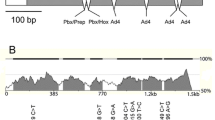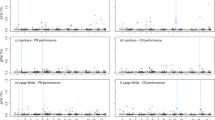Abstract.
Our knowledge of the genetic factors affecting obesity is increasing, but information about the individual gene effects remains limited in humans as well as in animal models. The melanocortin-4 receptor gene (MC4R) has been implicated in the regulation of feeding behavior and body weight in humans and mice. We have studied MC4R as a candidate gene for the control of economically important growth and performance traits in the pig. A missense mutation was identified in a region highly conserved among melanocortin receptor (MCR) genes. To determine whether there was an association of this MC4R polymorphism with phenotypic variation, we tested the mutation in a large number of individual animals from several different pig lines. Analyses of growth and performance test records showed significant associations of MC4R genotypes with backfat and growth rate in a number of lines as well as feed intake overall. It is probable that the variant amino acid residue of the MC4R mutation (or a closely linked mutation) causes a significant change of the MC4R function. These results support the functional significance of a pig MC4R missense mutation and suggest that comparative genomics based on model species may be equally important for application to farm animals as they are for human medicine.
Similar content being viewed by others
Author information
Authors and Affiliations
Additional information
Received: 21 June 1999 / Accepted: 9 September 1999
Rights and permissions
About this article
Cite this article
Kim, K., Larsen, N., Short, T. et al. A missense variant of the porcine melanocortin-4 receptor (MC4R) gene is associated with fatness, growth, and feed intake traits. 11, 131–135 (2000). https://doi.org/10.1007/s003350010025
Issue Date:
DOI: https://doi.org/10.1007/s003350010025




